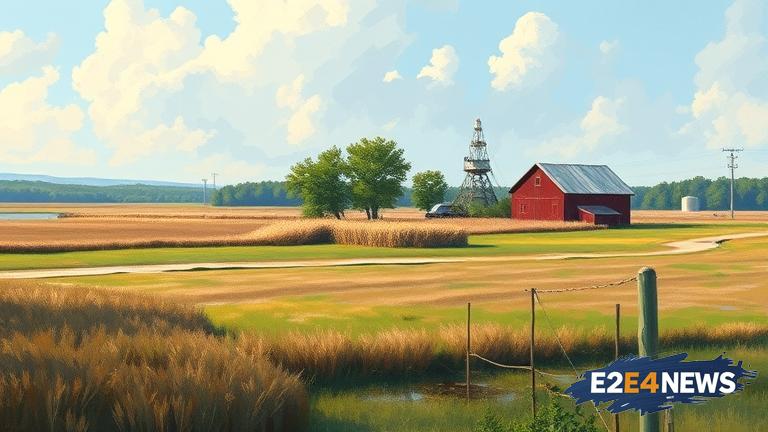Maryland’s Eastern Shore, known for its picturesque landscapes and rich agricultural heritage, is facing a growing concern over farm pollution. The region’s farms, which produce a significant portion of the state’s agricultural output, are being scrutinized for their potential impact on the environment and public health. The issue of farm pollution is complex, with multiple factors contributing to the problem. One of the main concerns is the use of fertilizers and pesticides, which can contaminate soil, water, and air if not used properly. Additionally, the storage and disposal of animal waste from large-scale farming operations have been identified as a significant source of pollution. The consequences of farm pollution are far-reaching, with effects on local waterways, wildlife, and human health. For example, excess nutrients from fertilizers can lead to the growth of harmful algae blooms, which can deplete oxygen in waterways and harm aquatic life. Furthermore, the pollution of groundwater sources can have serious implications for public health, particularly in rural areas where residents rely on wells for drinking water. The Maryland Department of the Environment has implemented various regulations and initiatives aimed at reducing farm pollution, including the use of best management practices and the creation of nutrient management plans. However, some argue that more needs to be done to address the issue, including increased funding for conservation efforts and stricter enforcement of existing regulations. The Eastern Shore’s agricultural community is also taking steps to address the issue, with many farmers adopting sustainable practices and investing in new technologies to reduce their environmental footprint. Despite these efforts, the issue of farm pollution remains a contentious one, with some arguing that the economic benefits of farming outweigh the environmental costs. Others argue that the long-term sustainability of the region’s agricultural industry depends on its ability to balance economic and environmental concerns. The state government has established programs to help farmers implement conservation practices, such as the Maryland Agricultural Water Quality Cost-Share Program. This program provides financial assistance to farmers who implement best management practices, such as cover cropping and buffer strips, to reduce soil erosion and nutrient runoff. Additionally, the University of Maryland has established the Eastern Shore Regional Agricultural Center, which provides research and education on sustainable agricultural practices. The center works with farmers, extension agents, and other stakeholders to develop and implement effective conservation strategies. In recent years, there has been an increase in public awareness and concern about farm pollution on the Eastern Shore. This has led to a growing demand for more sustainable and environmentally friendly farming practices. Some farmers are responding to this demand by adopting organic or regenerative farming methods, which prioritize soil health, biodiversity, and ecosystem services. These approaches can help to reduce the environmental impact of farming, while also improving the quality and nutritional value of the food produced. However, transitioning to more sustainable farming practices can be a challenging and costly process, particularly for small-scale farmers. To address this challenge, the state government and non-profit organizations are providing technical and financial assistance to farmers who are interested in adopting more sustainable practices. Overall, the issue of farm pollution on Maryland’s Eastern Shore is complex and multifaceted, requiring a comprehensive and collaborative approach to address. By working together, farmers, policymakers, and community members can help to reduce the environmental impact of farming, while also promoting the long-term sustainability of the region’s agricultural industry.
